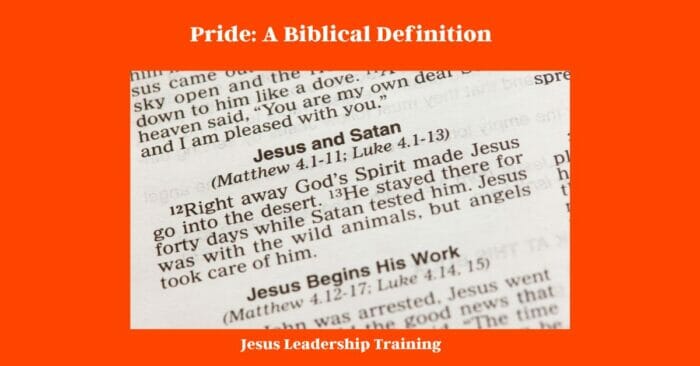The biblical definition of pride is “an inordinate love of one’s own excellence.” This means that we should love ourselves and our accomplishments, but not to the point where it becomes sinful. In fact, Scripture tells us that God opposes the proud but gives grace to the humble (1 Peter 5:5). So how can we make sure that we maintain a healthy sense of pride in our lives without crossing the line into sin?
Years ago I led a Mission Team of about 15 People, for two weeks of evangelism in Coomacka, Guyana. It is on the Timera River. It was a small bauxite Mining Town of about 1500-2000 villagers.
That year I took two ministers with me. I loved both of the men, they both had fervent hearts in planting the gospel. One of the older preachers, when he spoke, filled his messages with “I” just about every few minutes.
I Baptized so many people.
I preached to many people.
I Did this
I Started That.
It was so much that it developed anger in the rest of the team, they felt that he was taking credit for all the work. One of my closest friends came to me and said, you know we are here working hard too.
All the things he was saying were true but his pride and arrogance and lack of Humility were hurting the team. I was only a young preacher at the time, and took him on a walk and gently explained his need to dial it back. He was in his 60″s spent his whole life preaching. He corrected and things went great. We baptized 56 People on that campaign. But he never went back with me to Guyana again. He continued to go to Guyana but he went by himself with his wife from then on.

Table of Contents
Today’s Selfies (Pictures of You)
- Each Day – 90 Million Selfies Taken Every Day
- Last Year 24 Billion Selfies Uploaded to Google
- People Arrested Because taking Selfie Committing Crime
- Death By Selfie – Over the Last 2 Years 50 People have died trying to take the Perfect Selfie
Pride: A Biblical Definition
: The dictionary defines pride as “a feeling of satisfaction that comes from achieving something or being approved of by other people.” However, the Bible has a very different definition of pride. In the Bible, pride is considered to be a sin. It is defined as “self-importance and a lack of humility.” A proud person seeks inordinate self-esteem, and that kind of pride, haughty eyes, prideful person. God says that Pride goeth before the fall.
Why is Pride Considered a Sin?
Pride is considered to be a sin because it goes against God’s design for our lives. When we are proud, we are putting ourselves above God. We are saying that we know better than He does. Pride is a form of rebellion. It is putting our own desires and plans ahead of what God has for us.
Pride is also dangerous because it leads to other sins. For example, when we are proud, we are more likely to lie or cheat in order to make ourselves look better than others. We may also become angry and resentful towards those who don’t share our point of view. Pride can also lead us to judgmental and critical attitudes towards others.
What Does the Bible Say About Pride? (Bible Definition)
The Bible has a lot to say about pride. In Proverbs 16:18, it says, “Pride goes before destruction, and a haughty spirit before a fall.” This means that when we are proud, we are setting ourselves up for a fall. Our pride will eventually lead to our downfall.
In James 4:6, it says, “But he gives more grace. Therefore it says, “God opposes the proud but gives grace to the humble.”” This verse tells us that when we are humble, God will give us His grace. However, when we are proud, He will oppose us.
Pride is considered to be a sin because it goes against God’s design for our lives. When we are proud, we are putting ourselves above God. We are saying that we know better than He does. Pride leads to other sins such as lying, cheating, anger, resentment, judgment, and criticism. The Bible tells us that when we are humble, God will give us His grace but when we are proud, He will oppose us.

Bible Examples of Good Pride in the Bible
The Bible is full of examples of both bad and good pride. In this blog post, we will focus on some of the examples of good pride that can be found in the Bible. Specifically, we will look at two Old Testament examples and two New Testament examples. Hopefully, this will give you a better understanding of what characteristics constitute good pride.
God
After God Finished Creation he said, “It is very good.” This shows us that it is not prideful to take satisfaction in our work. It is good to be proud of what we have accomplished. We should take pride in our work and strive to do our best.
Joseph
In the book of Genesis, we see the story of Joseph. Joseph was sold into slavery by his brothers. He was falsely accused of rape and spent many years in prison. However, through it all, Joseph remained faithful to God. As a result, he was greatly blessed by God. He became the second-most powerful man in Egypt and was able to save his family from starvation during a time of famine. Joseph’s story shows us that it is okay to be proud of our accomplishments, even if they come as a result of difficult circumstances.
Esther
Another good example of pride can be found in the book of Esther. Esther was a Jewish woman who became queen of Persia. When she learned that her people were going to be destroyed, she bravely went before the king and pleaded for their lives. As a result, her people were saved and she became a hero. Esther’s story shows us that it is okay to be proud of our accomplishments, even if they come as a result of difficult circumstances.
In Esther 4:14, Esther is trying to get her husband to allow her to go before the king to beg for mercy on behalf of her people. Her husband tells her that she may go, but she risks death if she does. Esther responds by saying, “If I perish, I perish.” In other words, she was willing to risk death in order to save her people. This is a great example of good pride because she put others before herself and was willing to make a sacrifice for the greater good.
Apostle Paul
In the New Testament, we see the story of Paul. Paul was a great evangelist who spread the gospel all over the world. He also wrote many of the books in the New Testament. In Acts 20:24, it says, “But I do not account my life of any value nor as precious to myself, if only I may finish my course and the ministry that I received from the Lord Jesus, to testify to the gospel of the grace of God.” This shows us that Paul was proud of his accomplishments but he did not let it go to his head. He was humble and remained focused on serving God.
Peter
Another good example of pride can be found in the story of Peter. In Acts 11:17, it says, “If then God gave the same gift to them as he gave to us when we believed in the Lord Jesus Christ, who was I that I could stand in God’s way?” This shows us that Peter was proud of his accomplishments but he did not let it go to his head. He was humble and remained focused on serving God.
In Acts 5:29, Peter and the other apostles are told by the Sanhedrin to stop preaching about Jesus. But Peter replied, “We must obey God rather than men.” This is a great example of good pride because he was willing to put his faith above everything else – even when it meant disobeying an authority figure.
Daniel
Another Old Testament example comes from the book of Daniel. In Daniel 3:16-18, Shadrach, Meshach, and Abednego are brought before King Nebuchadnezzar because they refused to worship his golden image. The king gave them one last chance to change their minds and worship the image, but they still refused. As a result, they were thrown into a fiery furnace. However, God protected them and they emerged unscathed. This is another great example of good pride because they were willing to stand up for their beliefs even when it meant facing certain death.
As you can see, it is possible to be proud without letting it go to your head. It is okay to take satisfaction in our work and accomplishments as long as we remain humble and focused on serving God.
These are just a few examples of good pride that can be found in the Bible. There are many more examples out there – both in the Bible and in real life. When faced with a situation where you have to choose between doing what is easy or doing what is right, always choose what is right – even if it isn’t easy. That is true strength and true integrity. And that is something that God always looks favorably on!

Bible Examples of where Pride became Sin
Satan
It’s no secret that Satan is full of pride. But what does the Bible specifically say about his pride? Let’s take a look at some of the most noteworthy examples.
One of the most well-known examples of Satan’s pride is found in Isaiah 14:12-14. In this passage, Satan is described as wanting to be like God: “How you are fallen from heaven, O Lucifer, son of the morning! How you are cut down to the ground, You who weakened the nations! For you have said in your heart: ‘I will ascend into heaven, I will exalt my throne above the stars of God; I will also sit on the mount of the congregation On the farthest sides of the north; I will ascent above the heights of the clouds, I will be like the Most High.'”
This passage shows us that not only does Satan want to be like God, but he also wants to be higher than God. He wants to be worshiped and exalted above all else. This is a clear example of Satan’s sinful pride.
Another example can be found in Luke 4:5-8. In this passage, Satan tries to tempt Jesus by offering him all the kingdoms of the world if he would just bow down and worship him. Here again, we see Satan’s desire for power and worship. He wants to be exalted above all else—even above Jesus himself.
These examples make it clear that Satan’s pride is one of his most noteworthy characteristics. He is full of arrogance and self-importance, and he wants nothing more than to be worshiped and exalted above all else. As Christians, we should beware of these same tendencies in our own lives. We should humility humble ourselves before God and give him all the glory and honor due his name.
Nebuchadnezzar
He was so prideful that he even made an idol of himself and demanded that the people worship it.
This act of pride eventually led to Nebuchadnezzar’s downfall. In Daniel chapter four, we see that God sends an angel to warn Nebuchadnezzar that he will be driven from his kingdom and live like a wild animal if he does not repent of his pride. Thankfully, Nebuchadnezzar heeds the warning and repents before it’s too late. He recognizes that God is the one true king and gives him all the glory and honor due to his name.
Pharaoh
The Bible is full of examples of people who let their pride get the best of them. One of the most well-known examples is Pharaoh from the book of Exodus.
We see in Exodus chapter seven that Pharaoh’s heart is hardened by pride and he refuses to let the Israelites go, even after God sends Moses to warn him. As a result, God brings plagues upon Egypt and eventually leads the Israelites out of slavery. Pharaoh’s pride ultimately leads to his downfall.
Jezebel
Jezebel was Ahab’s wife and she was known for her extreme pride and wickedness.
In I Kings 21, we see that Jezebel’s pride leads her to falsely accuse an innocent man and have him put to death. This act of wickedness eventually leads to Jezebel’s own downfall, as God sends two bears to tear her apart.
Samson
Samson’s pride caused him to end up in the hands of his enemies.
The story of Samson is found in the book of Judges. We see that Samson’s pride leads him to disobey God and tell Delilah his secret—that his strength comes from not cutting his hair. As a result, Delilah betrays him and he is captured by his enemies. His pride ultimately leads to his downfall.
As we can see, pride is a serious issue that can have devastating consequences. We should all beware of pride in our own lives and humble ourselves before God. Only then can we avoid the same fate as those who let their pride get the best of them.

Is it a sin to be Proud
The Bible is clear that pride is a sin. In fact, Proverbs 8:13 says, “To fear the Lord is to hate evil; I hate pride and arrogance, evil behavior and perverse speech.” And in James 4:6, we are told, “But he gives us more grace. That is why Scripture says: ‘God opposes the proud but gives grace to the humble.'”
So pride is definitely something that God hates. But what is pride, exactly? Pride is an inflated sense of self-importance. It’s thinking that we are better than others and looking down on them because of it. Pride is also related to our attitude. When we are proud, we tend to be judgmental, rude, and even arrogant.
Being proud is not only a sin, but it’s also detrimental to our relationships with others. When we are proud, we push people away and isolate ourselves from those who could love us and care for us. We also miss out on opportunities to learn and grow as people.
Proud people focus on their own superiority, sometimes the sin of pride gets to the point of having a lying tongue, becoming a false witness, those things the Lord Hates.
Characteristics include:
- Lofty airs
- Own Strength
- Noble self-esteem
- Unreasonable conceit
- Opposite of the spirit of Humility
- High Opinion of One’s Self
- Exalting own abilities
- Absence of Humility
- Consciousness of power
It Is the opposite of :
- Spiritual Growth
- Good Deeds
- Humble hearts
- Kingdom of Heaven
When does Pride Cross over to sin?
Pride: feeling or showing too much self-respect, admiration for yourself, or satisfaction with what you have done. Is there anything wrong with having pride in oneself? Do you know when enough is enough and your pride has turned into sinful behavior?
The book of Proverbs says, “Pride goes before destruction and a haughty spirit before a fall.” (Proverbs 16:18) So if we want to stay away from destruction and falling, we must be conscious of our pride levels. How do we do that? Let’s take a look at three ways.
#1: Be Humble
No one likes a show-off. No matter how great of a job you did or how good you look today, keep it to yourself, or those closest to you will see right through you. Showing off comes from a place of insecurity which is the direct opposite of humility. To avoid coming across as arrogant, stay humble.
#2: Check Your Motives
Oftentimes when we do things, we have ulterior motives. We may be nice to people because we want something from them. Maybe we tell our boss how much we love our job so that we can get a raise. While it’s okay to have goals and ambitions, make sure that your primary motive isn’t always self-serving.
Doing things with pure motives will put you at ease and help build better relationships with others around you because they will trust your intentions.
#3: Mind Your Attitude
Your attitude says a lot about you as a person. If you regularly complain orarianism tateno cursing people out in your head then it might be an indication that your pride has taken over. It’s one thing to be confident but being rude crosses over into sinful behavior real quick. Be mindful of your attitude and try to keep things positive as much as possible!
#4: Don’t Compare Yourself to Others
This one is tough because we live in a society that’s constantly comparing us to others. Whether it’s through social media, commercials, or even just walking down the street, we are bombarded with images and messages telling us that we need to be skinnier, taller, richer, etc.
It’s easy to get caught up in comparing ourselves to others and thinking that we’re not good enough.
The truth is, we are all unique and special in our own way. God made us each unique for a reason, so why compare ourselves to others? When we do, it only leads to feelings of insecurity and pride. So the next time you find yourself comparing yourself to someone else, stop and remind yourself of your uniqueness.
7 Dangers of Pride.
There’s no denying that pride is a deadly sin. Just ask anyone who’s ever been on the receiving end of a cruel remark or a thoughtless action. But what is it about pride that makes it so dangerous? Let’s take a look at seven dangers of pride.
1. Pride is the root of all conflict.
If you trace any conflict back to its source, you’ll find that pride was at the root of it. Whether it’s a fight between friends, a feud between family members, or even a war between nations, pride is always at the heart of the matter. That’s because when we’re proud, we’re more likely to put our own interests ahead of others. And when we do that, conflict is sure to follow.
2. Pride leads to division.
When people are proud, they tend to divide themselves into “us” and “them.” We see this happen all the time in politics, with people on different sides of the aisle refusing to work together for the common good. But it also happens in our personal lives, as friends and family members grow apart because of their differing opinions and worldviews. Pride leads to division because we’re more concerned with being right than we are with being united.
3. Pride causes us to miss out on God’s best for our lives.
God has good plans for us, but pride can cause us to miss out on them. That’s because when we’re full of pride, we’re not open to hearing what God has to say. We think we know better than He does, and so we ignore His guidance and go our own way instead. As a result, we often find ourselves living below our potential and falling short of His best for us.
4. Pride makes us insensitive to others’ needs.
One of the most dangerous things about pride is that it makes us insensitive to the needs of others. When we’re wrapped up in our own world, it’s hard to see how someone else might be struggling. We become self-centered and focused only on our own wants and needs, without considering how our actions might impact those around us. This can lead to all sorts of problems in our relationships, both personal and professional.
5 . Pride keeps us from admitting when we’re wrong.
Because prideful people are so focused on being right, they have a hard time admitting when they’re wrong. This can lead to all sorts of problems, both in their personal lives and in their careers. When someone is unwilling to admit they were wrong, it leads to conflict and division. It also stops them from learning and growing, which can prevent them from reaching their full potential.
6 . Pride causes us to miss out on blessings.
When we’re full of pride, God’s blessings often pass us by. That’s because we’re not humble enough to receive them. We think we don’t need His help, or that we can do things on our own. But the truth is, God has so much more for us than we could ever imagine. He wants to bless us abundantly, but our pride often gets in the way.
7. Pride ultimately leads to destruction.
Pride is like cancer that slowly eats away at our relationships, our careers, and even our lives. It’s destructive because it puts self-interest above everything else. And when that happens, things usually end up going downhill fast.
7 Steps on How to overcome pride.
As Christians, we are called to humility. However, that does not mean that overcoming pride is easy. In fact, it can be one of the most difficult challenges we face. But with God’s help, it is possible to overcome pride and live a life of humility. Here are seven biblical steps on how to do just that.
1. Acknowledge that you have a problem with pride.
The first step in overcoming any problem is admitting that you have one. If you’re not honest with yourself about your prideful tendencies, then you’ll never be able to address them head-on. So take a step back and assess your life. Are you always trying to be the best? Do you find yourself putting others down? Do you get jealous easily? If you answered yes to any of these questions, then chances are you need to work on your humility.
2. Repent and ask God for forgiveness.
Once you’ve identified areas in your life where pride has a foothold, it’s time to turn to God and ask for His forgiveness. This may be difficult, but it is essential if you want to move forward in your walk with Christ. So humble yourself before God and repent of your prideful ways. He is faithful and just and will forgive you if you turn from your sin (1 John 1:9).
3. Study Scriptures on Humility.
After acknowledging your pride problem and repenting, it’s important to study Scripture on humility. This will help remind you of what God says about living a humble life and give you the tools you need to do so. A few key verses to look up are Philippians 2:3-4, James 4:6-10, 1 Peter 5:5-7, and Proverbs 16:18-19.
4. Surround yourself with humble people.
One of the best ways to overcome pride is to surround yourself with people who are already living humble lives. These people can serve as examples for you and help hold you accountable when pride tries to creep back into your life..
5. Be quick to apologize .
When you mess up, don’t try to justify your actions or make excuses—just apologize quickly and sincerely.
6. Give credit where credit is due
Another way to practice humility is by giving credit where credit is due—even if that means giving credit to someone who isn’t as good as you are at something.
7. Serve others
And finally, one of the best ways to overcome pride is by serving others without expecting anything in return.
Final Thoughts – Pride a Biblical Definition
When we work hard pride can creep in and become ugly. So it’s important to strive for Humility. Pride is one of the seven deadly sins for a reason. It is destructive and leads to all sorts of problems, both in this life and the next. As Christians, we should guard against pride in our own lives and strive to live humbly before God. Only then can we avoid the same fate as those who let their pride get the best of them.
God Bless Greg


